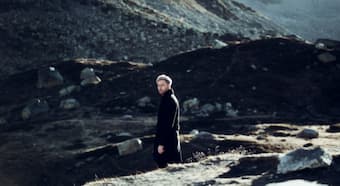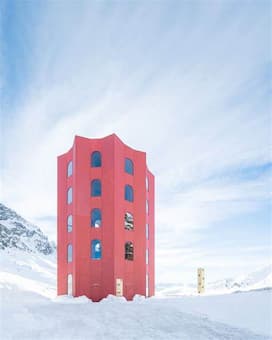
Benjamin Appl © David Ruano
British director John Bridcut has made a striking new film of Winterreise, Schubert’s great song cycle, with baritone Benjamin Appl and pianist James Baillieu. It’s all the more remarkable because it was made during the first year of the pandemic, and on a very tight budget.
It’s filmed in Switzerland, in and around the extraordinarily striking Julier Tower, a remarkable modern theatre constructed of wood and glass, whose stark, blood-red walls contrast sharply with the snow-covered landscape in which it stands. The scene is set immediately, with Benjamin Appl trudging through deep snow (apparently, the snow began to fall just before filming began). Here is Schubert’s lonely wanderer, having left the house of his beloved, cast out on a journey of reflection on love lost, regret, sorrow, the torment of reawakening hope and the journey to resignation. Set to poems by Wilhelm Müller, this is a literal and metaphorical journey for the protagonist. This new film also sets the narrative in the context of our current times, with its themes of loneliness, separation and isolation – powerfully portrayed through the cold, people-less landscape.
Franz Schubert: Winterreise, Op. 89, D. 911 – No. 3. Gefror’ne Tränen (Benjamin Appl, bass; James Baillieu, piano)

Julier Tower
There is no denying the arresting grandeur of the setting of Bridcut’s Winterreise. Bright white, deep snow, stunning Alpine peaks – and that curious modern structure set amidst it all. Benjamin Appl is as striking as the landscape, as perfectly chiselled as those mountains, with deep blue eyes which burn with passion or glaze with tears in the more poignant songs or passages, or occasionally fix the viewer with an unsettling directness which only adds to the power of Müller’s text and Schubert’s music. He has a wonderfully clear, clean voice, with a range from a whispered pianissimo (the level of control here is impressive) to a raging fortissimo. James Baillieu, playing a gorgeous Bösendorfer piano, whose case seems to hark back to a Schubert-era instrument, brings depth and clarity to the music. He avoids ponderousness in the darker songs and there are moments of delicious sweetness or tender poignancy – in Der Lindenbaum or Frühlingstraum, for example. But it is in the darker or more desolate songs that Baillieu really portrays the wanderer’s predicament, often simply through judiciously placed single notes or a fractional pause (“agogic accent”) before placing a note (Gefrorne Tränen, for example). The closing song, Der Leiermann, is absolutely devastating in its spare simplicity.
Franz Schubert: Winterreise, Op. 89, D. 911 – No. 5. Der Lindenbaum (Benjamin Appl, bass; James Baillieu, piano)
Franz Schubert: Winterreise, Op. 89, D. 911 – No. 24. Der Leiermann (Benjamin Appl, bass; James Baillieu, piano)
The performance of the music is first class, really engaging, and both singer and pianist deftly capture Schubert’s emotional range and curious harmonic shifts (as James Baillieu says in one of the commentaries, the shift from major to minor in Schubert is like moving from one universe to another). The songs are occasionally interspersed with commentary on the music, and there’s a wonderful segment of Appl in conversation with mezzo-soprano Brigitte Fassbaender, discussing the appropriateness of this music for the female voice as well as the male.
But I have to admit, I found quite a lot of the film distracting. Pondering this after the event, I suspect it is because I have my own internal image of the lonely wanderer and for me, he (or she) is not in an awe-inspiring Alpine landscape, but rather trudging along a snowy road, in a flat, featureless landscape only occasionally relieved by a signpost, a village, a stream….. I also found some of Appl’s acting a little contrived – he didn’t always seem entirely comfortable (and presumably quite cold!) out in the snow drifts, and, for me, he was always far more convincing when inside the building with Baillieu (and there are some wonderful moments when he sings seated at the pianist’s side, a nod, perhaps, to the way the songs would have been performed in Schubert’s day).
However, for those less familiar with the narrative and/or the music, the film is an excellent introduction, the story compellingly matched in striking images and impressive sound quality which allows us to fully appreciate and enjoy composer, music and of course the musicians.
‘Winter’s Journey: Schubert’s Winterreise’ is available via the BBC iPlayer and Marquee TV worldwide.
For more of the best in classical music, sign up to our E-Newsletter
Winter Journey: Schubert’s ‘Winterreise’ – Behind the scenes
